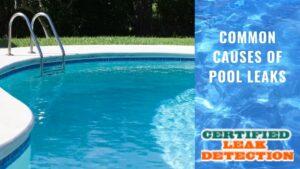
You may be the most conscientious swimming pool owner in Central Florida, faithfully following a maintenance schedule and paying attention to every nuance of its condition. But no matter the level of your diligence and dedication, your pool will eventually develop a leak. Even the type of pool makes no difference. Be it concrete, fiberglass, vinyl liner or above-ground, each is susceptible to leaking. Although the types of pools vary, their leaks tend to have basic common causes. Becoming familiar with them will help you watch for signs of trouble and call a professional – like our experienced experts at Certified Leak Detection – to pinpoint the problem.
Everybody Talks About Swimming Pool Leaks, But What Causes Them?
Pool leaks aren’t the result of some mysterious process. While you may be unpleasantly surprised when one occurs, it isn’t as out-of-the-blue as it seems. Leak Science provides a list of the following issues that can cause a leak:
Mechanical issues
The water level drop in your pool is not that apparent if it has an automatic fill device. But an increased water bill and fluctuating chemical imbalance can result in “green pool” algae growth, which is indicative of a leak.
Skimmers are often the source of this type of leak. Our blog post – “Is Your Pool Skimmer Leaking?” – covers the most obvious sign, which is when the water drops below the skimmer level and stays there. You can turn off the pump or close the skimmer valves and run the pump on the drain mode to check for a leak. While a pool owner’s biggest fear is a leak in the skimmer pipe because of the extensive, expensive repair it requires, this is seldom the cause. However, if your pool leaks more when the pump is off, or you can see air getting sucked into the pump basket, it’s a good indication of this worst-case scenario.
The pool pump itself may be the culprit. Our blog post – “Does Your Pool Pump Have a Leak?” – covers the three most frequent places for a pool pump to leak: the suction side, the pressure side and on the shaft seal.
Structural damage
Leaks due to structural damage can occur as cracks anywhere in a concrete or fiberglass pool. They often start out small and are generally only cosmetic in nature – at first. The longer you wait to repair them, the worse they get. This can lead to more serious structural problems and expensive repair bills!
Leaks can also happen around fixtures, such as lights and returns. Our blog post – “Is Your Pool Light Leaking?” – covers why pool light leaks are so insidious, and how to locate and repair one.
Also pay attention if the ground on or near your property has been disrupted. Construction activity – such as building an addition to your house, or a new house being built nearby – can cause the ground to shift, which could affect the integrity of your pool’s structure.
Plumbing
In addition, ground movement or corrosion can damage your underground plumbing, resulting in leaks. These issues can also puncture the floor of your pool. However, underground leaks are not easy to detect on your own. You need expert leak detection specialists to locate them. If you suspect an underground leak contact Certified Leak Detection immediately.
Broken pipes
Your pool’s plumbing system is complex, which means that leaks can spring up in a variety of locations throughout the piping.
Leak in the return pipes
If the return pipes of your pool and the pool settle at different rates, there could be a leak where the return meets the pool wall. Leaks in return pipes are common.
Main drain leaks
It is tough to find a leak in the main drain. Since you should never drain your pool, locating a main drain leak is not easy. There could be a leak in the main drain around the fixture or the suction pipes. It can also develop leaks in the hydrostatic relief valve. The leak can often develop due to rust or a rock obstruction, preventing proper closure of the valve.
Skimmer pipe leak
As previously mentioned, a skimmer pipe leak is not easy to detect. Skimmers of concrete pools lie in the concrete encasing, making it difficult for you to reach the connection points. If you suspect a skimmer pipe leak, contact us immediately.
Equalizer line leak
Leaks in equalizer pipes are one of the most likely suspects with older swimming pools. The equalizer line in the pool is a non-pressurized pipe that connects from the main drain to the underside of the skimmer. Because it is usually found in older pools, it is often left out of major renovations. Again, locating this type of leak is a job for our professionals
Loose or broken fittings
While breaks, cracks, or collapses in the pipe can happen anywhere, they are most likely to be where joint connections have been made. This is very common, and can be fixed easily if the location is easy to access, as well.
Does the Type of Pool Construction Matter When It Comes to Leaks?
According to the knowledgeable people at Pools By Signature, many times, the cause of the leak relates to the type of pool you have. For example, fiberglass pools often develop leaks related to the plumbing if saturation or settling occurs. On the other hand, concrete pools tend to develop cracks related to age or sharp objects hitting the side of the pool. The common types of leaks in specific types of pool construction are as follow:
Fiberglass pool leaks
- Plumbing leaks beneath the pool that lead to saturation or settling – it’s not always easy to identify leaks related to plumbing issues because the intake and return lines are located beneath the pool decking.
- Fissures in the gelcoat surface can also occur and contribute to leaks, often resulting from improper handling and installation. The cracks need to be repaired and repainted as soon as possible to prevent the cracks from spreading and causing larger leaks.
Concrete pool leaks
- A sharp object can create a crack in a concrete pool.
- Age, along with wear and tear, can also contribute to the development of cracks in concrete over time.
- If decorative tiles are loose or detached, this can also contribute to a leak. The same is true for other loose or poorly installed accessories – including railings, the skimmer pad, and so forth.
Vinyl liner pool leaks
Vinyl liner pools can develop cracks or tears in the vinyl lining, causing it to leak. Sharp objects can cut the side of the pool, resulting in a leak. However, it is crucial to get the surface repaired as soon as possible to avoid further issues.
Above-ground pool leaks
According to Leak Science, locating a leak in an above-ground pool is extremely difficult. Their blog post provides a troubleshooting guide, and advises calling a professional leak detection service if you’re unable to find the source of the leak.
Signs of a Pool Leak
Just as there are common causes of pool leaks, there also are common signs to look out for. Pool maintenance expert Jason Hughes at River Pools lists the following:
- Unusually high water and electricity bills.
- Mushy and wet spots or standing water in your yard, especially around the pool.
- Standing water under pool equipment.
- Loose, cracked, or shifting pool tiles.
- Any crack on the pool surface or deck.
- Unexplained algae growth.
- Corroding pipes.
- The automatic filter releases water constantly.
Our blog post – “What Happens if You Ignore a Swimming Pool Leak?” – covers the damaging and expensive consequences of being unaware of a leak, or deciding to put it off and hope it doesn’t get worse (spoiler alert – it will).
As you may have noticed, we didn’t leave our usual message until the end. Unless you’re able to easily locate the source of a swimming pool, you need to call a pro! Certified Leak Detection uses technology and techniques we have developed over 20 years in business. In addition to quick detection of pool leaks, we provide industry-leading leak detection for spas and hot tubs. Serving areas throughout Central Florida – including Orlando, Longwood, Lake Mary, Sanford, Kissimmee, Clermont and Winter Springs – our team is ready to answer your call. Contact us for quick, reliable service!

